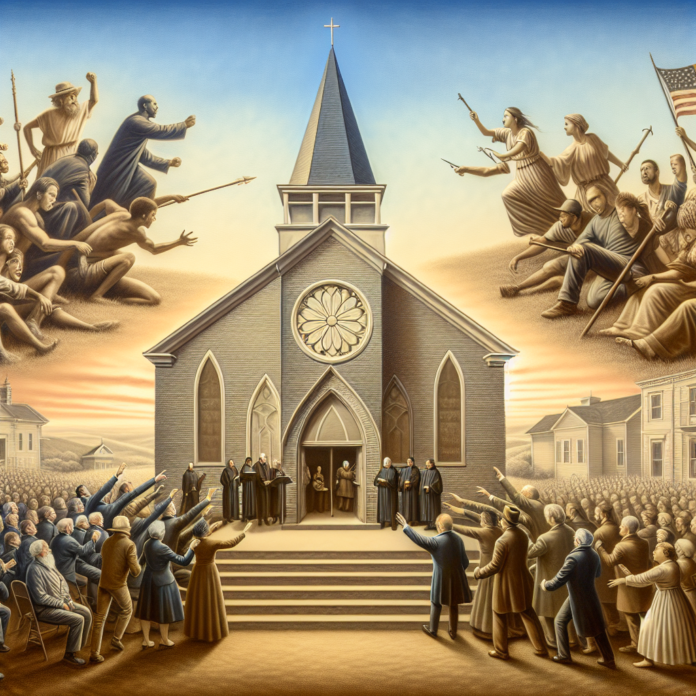Faith Under Siege: MAGA’s Influence on American Catholicism
In a nation as diverse and ever-evolving as the United States, the intersection of religion and politics has always been a contentious space. However, in recent years, this landscape has seen a particularly alarming shift with the rise of the MAGA movement and its infiltration into American Catholicism. This melding of far-right political ideology with religious dogma presents both a threat to the unity of faith communities and a challenge to the progressive values that have long sought to modernize religious practice. The infusion of MAGA’s influence has not only strained the Catholic Church internally but has also prompted a wider cultural clash that could reshape the future of American religion.
Historically, the Catholic Church in America has navigated various societal changes while maintaining a delicate balance between tradition and adaptation. However, the MAGA movement—a political wave characterized by nationalistic fervor, socio-cultural conservatism, and often, a blatant disregard for inclusivity—has emboldened a reactionary faction within Catholicism. These traditionalists promote a version of Catholicism that is not only resistant to change but actively hostile to progressive undertakings within the Church.
Such a shift is evident in the resurgence of the Latin Mass, a practice that had declined significantly following the Second Vatican Council (1962-1965). The Council had introduced vernacular languages into the liturgy, making the Mass more accessible and encouraging active participation among the faithful. However, the re-emergence of the Latin Mass among certain conservative groups seems less a reverence for historical liturgical practice and more a pointed resistance to the inclusive spirit engendered by Vatican II. This resurgence is not merely a spiritual preference but a cultural statement, aligning closely with the exclusionary and often incendiary rhetoric emblematic of the MAGA movement.
Pope Francis has emerged as a prominent figure advocating for a more inclusive, compassionate, and socially aware Catholic Church. His emphasis on issues like climate change, economic inequality, and the rights of marginalized communities directly contrasts with the conservative inclinations of the MAGA-aligned Catholics. Under his leadership, the Vatican has endeavored to bridge the gap between doctrine and modern societal issues. Yet, his progressive stance has drawn vitriolic opposition from traditionalist factions within the Church, further inflamed by MAGA’s divisive rhetoric.
The United States Conference of Catholic Bishops (USCCB) serves as a microcosm of this broader conflict. Historically an influential body within American Catholicism, the USCCB has seen increased polarization, with influential bishops championing conservative causes and others aligning more closely with Pope Francis’s vision. This polarization is particularly evident in discussions surrounding the Latin Mass, attitudes toward LGBTQ+ individuals, and responses to social justice movements. The tension reached a zenith during the 2020 presidential election, where certain bishops’ tacit support for MAGA-aligned political figures created a rift within the Church and between the Church and wider society.
While traditionalists argue they are preserving the sanctity and orthodoxy of the faith, their rigidity often manifests as a stark opposition to necessary reforms and inclusivity. Such inflexibility can alienate younger generations and diverse communities who seek a Church that is responsive to contemporary moral and social issues. As America grows increasingly diverse, a segment of the Catholic Church clinging to closed-mindedness and exclusion under the guise of tradition risks exacerbating the decline in church attendance and engagement.
Pope Francis’s papacy, marked by efforts to engage 21st-century crises and advocate for the underprivileged, offers a beacon of hope against this backdrop of division. His encyclical ‘Laudato Si’’, calling for urgent action against climate change, resonates with younger Catholics and those concerned about the planet. His ‘Amoris Laetitia,’ emphasizing the importance of love and compassion within familial structures, provides a humane perspective on issues such as divorce and family dynamics.
Moreover, Pope Francis’s firm stance on clerical sexual abuse scandals highlights a commitment to justice that contrasts sharply with the traditionally conservative elements that have, at times, prioritized the Church’s reputation over victim advocacy. His transparent and forthright approach to addressing these grave issues underscores a vision of a Church that is accountable and progressive, key attributes necessary for regaining trust and relevance in a modern context.
The challenge lies in fostering an authentic Catholic identity that embraces the richness of tradition while evolving to meet contemporary needs. This balance is essential not only for the spiritual nourishment of current generations but for the very survival of the Church as a relevant, moral, and unifying institution.
In conclusion, the MAGA movement’s sway over American Catholicism presents a profound challenge to the Church’s unity and modern relevance. The rise of conservative, exclusionary practices, epitomized by the resurgence of the Latin Mass, risks alienating emerging generations and diverse communities. By contrast, Pope Francis’s progressive and inclusive vision offers a pathway to reconciliation and renewal. It is imperative for the future of Catholicism in America that the Church aligns more closely with the compassionate and forward-thinking values that have the power to truly unify and heal a fractured society. Traditionalist impulses, when wielded as tools for exclusion, should be viewed not as guardians of authentic faith but as barriers to the Church’s mission of universal love and social justice.
